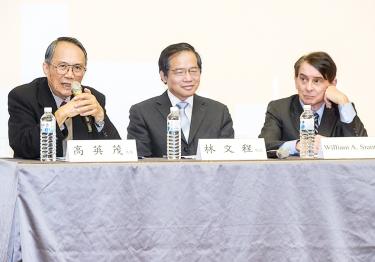US President Donald Trump’s unpredictability makes him “kind of afraid” of what might happen if Trump’s reported meeting with Chinese President Xi Jinping (習近平) next month in the US occurs, former American Institute in Taiwan (AIT) director William Stanton said yesterday.
Stanton, who led the AIT’s Taipei office from 2009 to 2012 during then-US president Barack Obama’s presidency, spoke to reporters in Mandarin on the sidelines of a forum in Taipei about Taiwan’s strategic planning during Trump’s term in office.
The forum was hosted by the Taiwan Forever Association and the International Committee for a Democratic Taiwan, and Stanton was one of the panelists.
While it is hard to predict what Trump and Xi would talk about when they meet, many political analysts have noticed the new US president’s inclination to pay little attention to policy issues during his meetings with foreign heads of state, Stanton said.
“From what I heard, during Trump’s meeting [last month] with Japanese Prime Minister Shinzo Abe, the US side did not even have someone there to take minutes and it had to use those kept by the Japanese afterwards,” Stanton said.
“That is why I am kind of afraid about his meeting with the Chinese leader, because I do not know if he is ready,” Stanton added.
Asked whether the Trump-Xi meeting would bode ill for Taiwan, Stanton said he was unsure, but added that he believed the biggest problem would be Trump’s tendency to flip-flop on issues and make conflicting statements.
He added that as Trump is more business-centric, Taiwan might not appear as valuable to him as in the eyes of Obama, who valued Taipei’s democratic achievements.
Turning to cross-strait issues, Stanton said he is of the opinion that President Tsai Ing-wen (蔡英文) has made a serious effort to maintain the “status quo” and ensure peace across the Taiwan Strait.
“However, it seems that the Chinese government is still not satisfied and insists on the so-called ‘1992 consensus,’” Stanton said, urging Beijing to respect the opinions of the Taiwanese, the majority of whom disagree with China’s viewpoints.
The “1992 consensus” refers to a tacit understanding between the Chinese Nationalist Party (KMT) and the Chinese Communist Party that both sides acknowledge there is “one China,” with each side having its own interpretation of what “China” means.
In 2006, former Mainland Affairs Council chairman Su Chi (蘇起) admitted making up the term in 2000, before the KMT handed power to the Democratic Progressive Party.
Tsai’s refusal to acknowledge the “1992 consensus” has resulted in several punitive measures by Beijing.
Source: Taipei Times - 2017/03/27





















